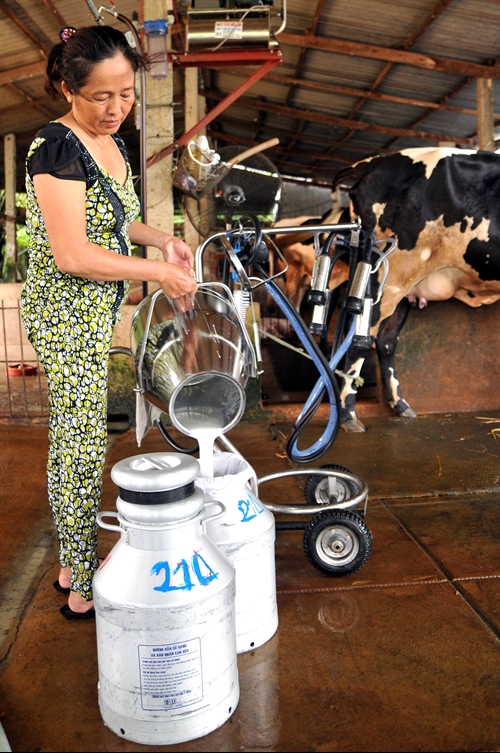 Economy
Economy

" />The country does not produce enough raw milk to meet domestic demand, but farmers are in trouble because dairy firms are opting to import cheaper powdered milk for their production purposes.
 |
| A farmer in Trung Lập Hạ Commune, Củ Chi District milks her cows. Farmers in the area are having difficulty selling their milk products. VNA/VNS Photo An Hiếu |
HCM CITY – The country does not produce enough raw milk to meet domestic demand, but farmers are in trouble because dairy firms are opting to import cheaper powdered milk for their production purposes.
In HCM City, which has the country’s largest number of milch cows, nearly 800 households in Củ Chi District are unable to sell fresh milk to dairy firms because they have not signed supply contracts.
Such farmers are having to sell their raw milk to other consumers including households who make yoghurt and sell fresh milk, or asking households that have a supply contract to help them.
According to Nguyễn Văn Hơn, head of the Giòng Sao Hamlet in Củ Chi’s Tân Phú Trung Commune, his hamlet has 40 households who breed about 700 cows.
Until now, most of the hamlet’s raw milk has been sold to big dairy companies like Vinamilk, FrieslandCampina and Long Thành Milk.
“However, these companies have recently tightened quality controls and limited their purchases,” he said.
Households without supply contracts are in a much more difficult situation, and face the prospect of giving up breeding cows for milk, according to Hơn.
Phạm Văn Đạt, who breeds six cows in Củ Chi’s Tân Phú Đông Commune and does not have a supply contract, said he had to sell raw fresh milk to those he hired to milk the cows for VNĐ7,000-9,000 (US$0.32 - 0.41) a kilo.
“The price has been pushed down, but I had no choice but to accept it,” he said.
Fresh milk is sold to dairy companies in HCM City at an average price of VNĐ11,628 a kilo, according to the city’s Department of Agriculture and Rural Development.
Several local newspaper reports have cited experts as saying the current situation has arisen because of the big price difference between fresh milk and imported milk powder.
They said imported powdered milk costs less than $2,000 a tonnes in the first two months of the year. If dairy firms use the powdered milk, it costs them a little more than VNĐ6,000 ($0.27) to produce a litre of liquid milk, just half the price of domestically produced fresh milk.
Of the 727,000 tonnes of raw milk produced in the country last year, about 145,000 tonnes were sold to individuals and traders and about 580,000 tonnes to dairy firms, according to Nguyễn Đăng Vang, chairman of the Việt Nam Animal Husbandry Association.
Meanwhile, domestic consumption of liquid milk was recorded at around 1.3 million tonnes last year.
But “nearly 60 pert cent of the country’s liquid milk consumed last year was reconstituted milk, which is powered milk mixed with water and flavour,” he said.
"The nutritious value of reconstituted milk is lower than that of fresh milk," he added.
He said labels used by dairy firms to sell their products should clearly state whether the milk is reconstituted milk or processed fresh milk. In case it is mixed, the labels should mention the percentage of reconstituted milk in the product, so that the consumers can distinguish between different products and make their choices, he said.
Currently, most liquid milk products are labelled “sterilised milk.”
Competition troubles
The number of milch cows nationwide has increased from 167,000 producing 381,000 tonnes of raw milk in 2012 to 300,000 cows producing 727,000 tonnes last year, according to the Animal Husbandry Department under the Ministry of Agriculture and Rural Development.
The ministry attributes the increase to some dairy firms increasing investment in their farms, in order to compete with imported products, tariffs are reduced under regional and international trade agreements signed by Việt Nam.
Vinamilk, for instance, has cows that can produce 28 litres of milk a day, matching international yields.
However, many cows bred by individual households can only produce 12-15 litres a day, and such dairy farmers are likely to suffer more over the next three years as import tariffs fall to zero under the Trans-Pacific Partnership, dairy company representatives have said.
Meanwhile, the price of imported powdered milk has fallen continuously in recent years because of oversupply.
Speaking at a meeting with Secretary of the HCM City Party Committee Đinh La Thăng on Tuesday (March 1), Mai Kiều Liên, general director of Vinamilk, said her company would have to reduce the purchase price of raw milk to about VNĐ9,000 ($0.40) a litre in the next three years to remain competitive.
Vinamilk, which has signed contracts with about 8,000 households nationwide,
currently buys fresh milk at VNĐ13,000 ($0.59) a kilo.
“If farmers still breed cows on a small and scattered scale, it will be difficult for them to reduce production costs,” she said.
Vinamilk has asked households who have signed supply contracts to replace their old cows with those that can yield 20 litres a day. Liên also suggested that farmers either increase their scale of operations or co-operate with neighbours to do so, in order to reduce their production costs.
The HCM City Department of Agriculture and Rural Development estimates that a household with less than five cows will have production costs of VNĐ11,619 per kilo, while those with 10, 20 or 50 cows have their costs reduced correspondingly to VNĐ9,332, VNĐ7,936 and VNĐ7,076 per kilo.
According to the department, the city has more than 2,500 households with less than five cows each.
In Việt Nam, milch cows are mostly bred in HCM City, Hà Nội, Long An, Lâm Đồng, Bình Định, Nghệ An and Sơn La provinces. –VNS




